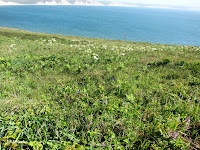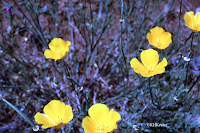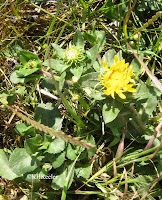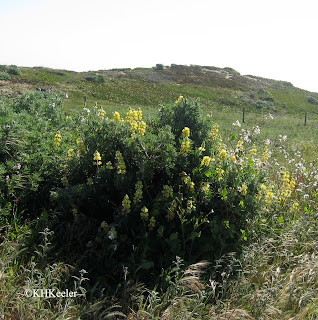 |
| Beach at Point Reyes National Seashore, California |
 |
| Dunes, Point Reyes National Seashore, California |
We were there in May and we really did have these beaches to ourselves.
 |
| beach at Point Reyes |
 |
| flowers on the headlands, Point Reyes |
The spring wildflowers were glorious. They dotted the headlands with color.
 |
| California poppy, Eschscholzia californica |
When I went to California in 1969 I had never before seen the California poppy, Eschscholzia californica (poppy family, Papaveraceae). Although today it is reported across most of the United States on the USDA Plants website, it appears to be native to the US west of the Sierras. It has been widely offered as a garden plant and is included in many wildflower seed mixes, so is now more widely distributed than its original range. I thought the fields of California poppies were spectacular.
 |
| California poppy, Point Reyes National Seashore |
Why aren’t these plants in cultivation?
Perhaps no one has yet thought them worth the time. For example, plants with tiny flowers don’t attract gardeners the way plants with large flowers do.
Other plants are hard to grow. It is not that people don’t want to cultivate them, but to sell plants you need to have lots of seeds or many pots of the plant. Some plants make this difficult. Perhaps they require some not particularly obvious conditions, such as starting wet but drying out, so they die frequently in the experimental garden. Others drop their seeds as fast as they ripen. In this case, gathering seeds for planting is difficult--you have to go back every couple days to get a few seeds each time. Other plants have complex dormancy conditions, so of 100 seeds, only 25 germinate. That is frustrating to growers and buyers think they've been sold bad seed. Other plants rarely survive transplanting, no matter how carefully you do it. These problems can be solved, but it requires someone to work at it. There are many plants for which that has not yet happened.
Another group of plants are troublesome in cultivation. I can’t speak for California plants, but some prairie wildflowers--one small aster comes to mind--spread so aggressively that after a few years I found myself digging them up to avoid having them take over the entire yard. And, even when spiny plants are beautiful, you need just the right place or they’ll stab you and your visitors.
Another group of plants are troublesome in cultivation. I can’t speak for California plants, but some prairie wildflowers--one small aster comes to mind--spread so aggressively that after a few years I found myself digging them up to avoid having them take over the entire yard. And, even when spiny plants are beautiful, you need just the right place or they’ll stab you and your visitors.
At Point Reyes National Seashore I wandered the hillsides enjoying the spring wildflowers without the anxieties of trying to tame them. I had a grand time seeing these old friends again this spring.
 |
| gumweed, Grindelia hirsutula |
 |
| lupine, Lupinus arboreus |
 |
| self-heal, Prunella vulgaris, a pretty weed from Europe |
 |
| various wildflowers in the grass, Point Reyes |
Despite making me think about what plants are cultivated, all the ones in my photos can be purchased as seeds or potted plants, I suspect. But I chose these photos to post because the nice big flowers easily make satisfactory photographs. You'll have to go see the more obscure plants for yourself.
Comments and corrections welcome.
Kathy Keeler, A Wandering Botanist
More at awanderingbotanist.com
Join me on Facebook

The beach pictures look beautiful, hope you had a great time there. The California poppy flowers are so pretty, it’s sad that not many people are interested in cultivating them.
ReplyDelete